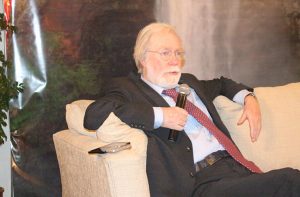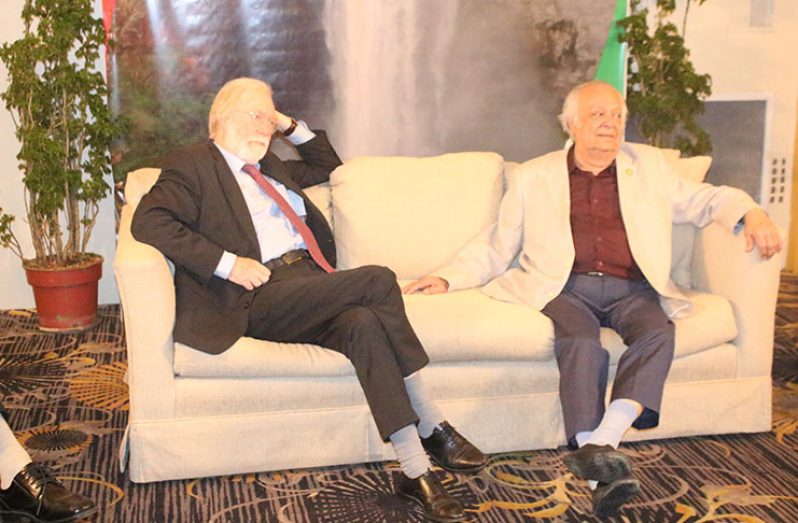… economist warns of damning consequences if Exxon contract is scrapped
…predicts better second deal,encourages new players
PROFESSOR Sir Paul Collier has warned against tearing up the ExxonMobil contract, saying that such a move would spell disaster for the country’s burgeoning oil-and-gas industry.
Speaking yesterday at an information session for journalists at the Pegasus Hotel, Collier, an economist, said that even though the contract might have issues, it is still a reasonable contract. Accompanying Sir Paul was distinguished Guyanese diplomat Sir Shridath Ramphal. Both men were among a panel of international experts who participated in a Cabinet Caucus earlier in the day on Guyana’s oil-and gas-future.
“As far as I could see, you got a reasonable deal,” said Collier, who made it clear that he does not have all of the information possible for him to make a qualified judgment on the merits of the contract.
“This is the first licence…there will be other licences,” he said. Collier noted that now is the time to get other operators in and said that subsequent contracts will be better.
“I think that as far as I could see you got a reasonable deal,” he said. “The next deal you get will be better than the first, the third deal will be better than the second. I suggest you use this as an opportunity to do some more licences. I think that should be the game plan,” he said.

“What would be absolutely disastrous is tearing this contract up. If you tear this contract up, nobody else will come,” he said. Collier said that governments have to establish credibility over the contracts they sign. “And if the first contract you sign you tear up in a couple of years, you’re dead,” he said.
He believes that the cost-recovery structure, though criticised by some, actually works to Guyana’s advantage as it means the country will reap a greater share of the production in a few short years after costs have been recovered. The contract with ExxonMobil has a cost-recovery percentage of 75 per cent. “So the first four years or so you don’t get so much money and then you get quite a lot more.
You still have to work
Sir Collier said that despite the “snakeoil” messages being peddled by some persons, people will still have to earn their living by working, even with the country becoming an oil producer.
“Will you still have to work? Yes. Is this big enough to make a decisive difference for your children? If you use it well, yes. This is the biggest historic opportunity that this society has ever faced. I suspect that it is the biggest opportunity that you will face in any of your lifetimes. So getting it right is really important,” said Collier.
Unequally matched
Collier believes indeed that Guyana is unequally matched against the likes of ExxonMobil in terms of resources and technical and legal expertise. However, he noted that this is not unique to Guyana, adding that while a government may have a few lawyers at their service, a company such as ExxonMobil may have a battery of about 700. “I don’t pretend that it is an even struggle. What you have got to do is build capacity to scrutinise what they pay in tax. Don’t assume that you can just trust them to pay the right amount,” he warned. “Build a specialist team in monitoring,” he said, citing the example of Norway which has a team of 40 tax revenue collection professionals. “You don’t need as many as 40, you need some, who can learn gradually the intricacies of the industry,” he said.
‘You have a duty to defend your institutions’
Collier said that stakeholders such as journalists must defend the institutions which periodically come under attack. “You need to build a critical mass of citizens in the country who understand why oil-rich countries need distinctive institutions which manage that money, and defend those institutions,” he urged.
Sir Paul is Professor of Economics and Public Policy at the Blavatnik School of Government and a Professorial Fellow of St Antony’s College. Sir Paul has written for the New York Times, the Financial Times, the Wall Street Journal, and the Washington Post. He has researched the causes and consequences of civil war; the effects of aid and the problems of democracy in low-income and natural-resources-rich societies, among others. He is an expert thinker on the “resource curse.”


.jpg)











